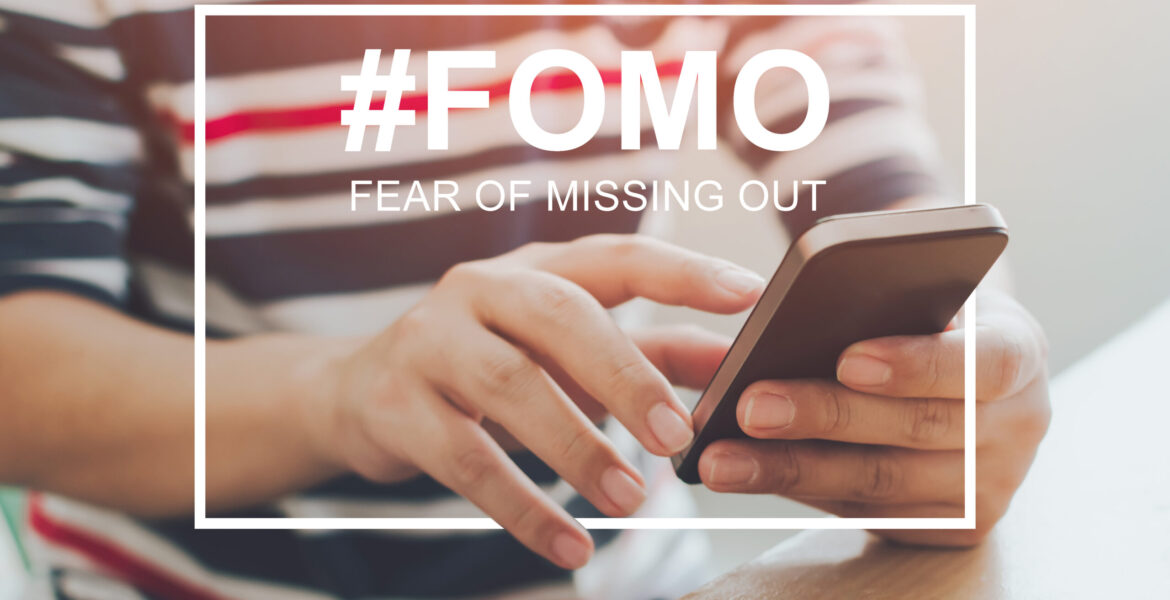FOMO: The Fear of Missing Out
11 Mart 2022 2022-03-11 12:58FOMO: The Fear of Missing Out

Director at BE İletişim (Marketing Communication Agency)
Have you ever just been stuck somewhere else from where you think you’re actually supposed to be, trying your best to reach out in time, wondering if you’d be missing out on something of great importance, a meeting, a date or a trip, those burning thrills, of trying to reach everything on time, those second thoughts feasting on your inner soul, pondering your decisions, one after the other?
How can we describe this feeling? Why and how does it occur so often? It’s that uneasy, sometimes all-consuming feeling that you’re missing out. FOMO-fear of missing out-that serious issue, that has been accounted for by medical professionals only recently, a buildup of extreme anxiety, that can and will surely result to an individual that may even require some therapy to help overcome those fears.
Over fifteen years ago, a Harvard student named Patrick McGinnis, wrote a column for his schools newspaper, naming it, Fear of a Better Option (FOBO) or more commonly known as, The Fear Of Missing Out (FOMO). The fear of ‘missing out’ can be defined as an element of the natural human behavior, which have been rooted in the historic origins. However, the ‘FOMO’ nomenclature does not appear in academic research before 2010, specifically in the work of Voboril (2010) [1]. Whatever its origin, the concept became a popular culture meme that was originally used to refer to a personal foible – often from a playful if slightly pejorative sense. “FOMO has been opportunistically adopted within direct ‘call to action’ appeals that are particularly aimed at the youth market. While calls to action are common in marketing, FOMO appeals are distinctive in that they call on the consumer to directly address their internal hesitancy, or resistance, to assent to an action”[1].
This panic concern can be triggered by a few actions and behaviors. According to specific studies, these are the most common pointers that may indicate whether you are showing signs of extreme FOMO. So how many of these signs resonate with yourself and require to act upon?
Always saying yes. Being mindful of the fact that you are agreeing to these situations is the first step to making a change. If the opportunity presents itself again and you can miss out on one occasion, it would be worth doing so accordingly to possible stop you suffering from FOMO[2]
Feeling negatively/excluded when missing out. Being excluded from an activity can feel extremely difficult. These can take many different forms from seeing a Facebook post shared by your friends to co-workers discussing the latest news you weren’t aware of for weeks on end. These types of emotions and feelings of negativity experienced from social interactions has been explained by psychologists as social integrations and connections are vital to the survival of mankind [2].
Low life satisfaction. Research conducted by medical professionals shows a direct correlation between low life satisfaction and FOMO. The direct relationship between the two has most likely surged from the increasing presence and usage of social media which showcase everyone’s daily lives [2].
High social media activity. Finding yourself endlessly scrolling through your social media feed throughout the day? Although the digital age, specifically social media, has given us the ability to know what one another may be doing every minute of the day is great, trying to reign the use of that power in is most certainly recommended[2].
The Fast-paced lifestyle. Having a fast paced lifestyle, jumping from one hobby to the next is a possible symptom of FOMO. A fast-paced lifestyle is defined as someone who is always very busy due to spreading themselves too thin and in most cases, the individual is not necessarily moving forward but always in a hurry to complete the next task [2].
Shiny object syndrome presence. Being “in” with the latest trends and quickly dropping them, leaving them for six is a great example that showcases shiny object syndrome. Not being able to focus on a particular subject, project or interest for a considerable amount of time before moving on to the next new adventure is a sign of missing out [2].
Concern about other people’s opinions. Those concerned about what other people may think has been recognized as one of the symptoms of FOMO. The most popular attributes that an individual worries what other people think about, in no particular order, include: clothes, hair styles, makeup choices, occupations, family perceptions, weight, background and overall lifestyle [2].
The urge to be surrounded by others. An overwhelming urge for having friends, colleagues or associates is a sign that you suffer from the fear of missing out. If you suffer from being alone and constantly find yourself at the end of the phone to reach out to someone you may already be experiencing FOMO [2].
Poor health behaviors. Lack of sleep, fatigue or a significant amount of stress is an indicator that you are having symptoms of missing out. A study in 2018 published in Motivation and Emotion found FOMO existed among all personalities but was especially more susceptible to those that suffered sleeping issues, fatigue or had significant amounts of stress [2].
In another study, responses to FOMO introducing scenarios in a diverse sample of 268 participants are experimentally assessed [3]. The findings supported the hypothesis that FOMO experienced in the context of social media is the same as FOMO experienced through direct social contact. Although previous research has shown social media to be important, it is found that people experience FOMO no matter how they find out about the alternate activity on which they are missing out. However, social media may still play a role in FOMO by increasing the likelihood that one finds out about alternate activities. That concludes to a major thought which can be summarized as follows: social media may make such reminders more frequent, leading to greater FOMO[3].
So how can we overcome this fear, understand where the problem lies exactly and try to lead to better behaviors that exacerbate it?
Start by Changing Your Focus. Rather than focusing on what you lack, try noticing what you have. This is easier said than done on social media, where we may be bombarded with images of things we do not have, but it can be done. Add more positive people to your feed; hide people who tend to brag too much or who are not supportive of you [4]. You can change your feed to show you less of what triggers your FOMO and more of what makes you feel good about yourself. Work on identifying what may be sapping your joy online. Work to minimize these as you add more to your feed (and life) that makes you happy [4].
Keep a Journal. It is common to post on social media to keep a record of the fun things you do. However, you may find yourself noticing a little too much about whether people are validating your experiences online. If this is the case, you may want to take some of your photos and memories offline and keep a personal journal of your best memories, either online or on paper. Keeping a journal can help you to shift your focus from public approval to private appreciation of the things that make your life great. This shift can sometimes help you get out of the cycle of social media and FOMO [4].
Seek out Real Connections. You may find yourself seeking a greater connection when you are feeling depressed or anxious, and this is healthy. Feelings of loneliness or exclusion are actually our brain’s way of telling us that we want to seek out greater connections with others and increase our sense of belonging. Unfortunately, social media engagement is not always the way to accomplish this-you might be running from one bad situation right into an even worse one. Rather than trying to connect more with people on social media, why not arrange to meet up with someone in person? [4]
Making plans with a good friend, creating a group outing, or doing anything social that gets you out with friends can be a nice change of pace, and it can help you to shake that feeling that you are missing out. It puts you in the center of the action. If you do not have time to make plans, even a direct message on social media to a friend can foster a greater and more intimate connection than posting to all of your friends and hoping for “likes”[5].
Focus on Gratitude. Studies show that engaging in gratitude-enhancing activities like gratitude journaling or simply telling others what you appreciate about them can lift your spirits as well as those of everyone around you. This is partially because it is harder to feel as if you lack the things you need in life when you are focused on the abundance you already have. It also holds true because making others feel good makes us feel good [4].
If you feel you are suffering from feelings of missing out, it can be helpful to reach out to a friend or spend some time reflecting on the things you are grateful for in your life. Activities like these can help us put things in perspective as we gather a greater sense of belonging and release the anxiety of “missing out” on anything [6]. And let’s not forget, this fear of missing out is the enemy of valuing your own time, so instead of fearing to miss out, embrace the joy of missing out (JOMO), and crush your goals!
References:
[1] Hodkinson, Chris (2019). “Fear of Missing Out (FOMO) Marketing Appeals: A Conceptual Model”. Journal of Marketing Communications, Vol. 25 (1), pp. 65-88.
[2] Shoreline Recovery Center. 10 Symptoms of Missing Out (FOMO). https://shorelinerecoverycenter.com/10-symptoms-of-missing-out-fomo/
[3] Milyavskaya, M., Saffran, M., Hope, N., and Koestner, R. (2018). “Fear of missing out: prevalence, dynamics, and consequences of experiencing FOMO”. Motivation and Emotion, Vol.42, pp. 725–737.
[4] Scott, E. (2021). “How to Deal with FOMO in Your Life? The Origin of FOMO and How It Affects Our Health” https://www.verywellmind.com/how-to-cope-with-fomo-4174664
[5] Barker, E. (2016). “This is the Best Way to Overcome Fear of Missing Out”. TIME. https://time.com/4358140/overcome-fomo/
[6] Nir and Far. “Getting over FOMO, the Fear of Missing Out” https://www.nirandfar.com/fomo/







Comment (1)
Rachid TEMOUCH
Congratulation Mariam and good luck…..